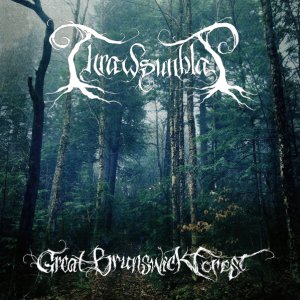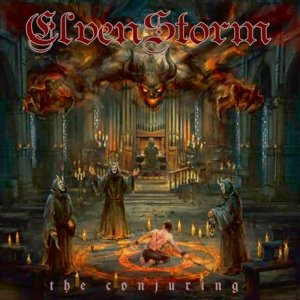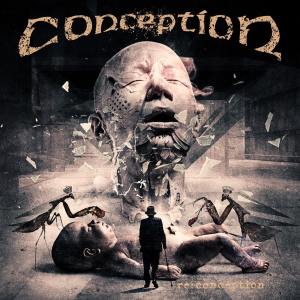
This was undoubtedly the most difficult to narrow down year-end albums list I’ve ever had to put together. It involved whittling down a sizable nominee pool to the final ten, the last spot of which I must’ve switched out well over a dozen times, constantly rethinking myself out of making a final decision. As I’ve always done, I prefer to only list and discuss what I think were the ten best songs and albums in these lists, not my top 25 or 50 or more that some other sites do. I think sticking to a tight ten forces you to really think about what you listened to the most over the year, and more importantly what really blew you away instead of merely satisfied you. Albums that I really enjoyed at various points throughout the year aren’t here, not because they’ve fallen out of favor, but simply because there were other amazing releases crowding the field. It was a great year to be a metal fan. Let me know in the comments below if you agreed or disagreed with this list!

1. Orphaned Land – Unsung Prophets & Dead Messiahs:

In a year packed full of remarkable new albums by newcomers and veterans alike, a few of which would’ve been able to top a year-end list at any other time, Orphaned Land’s conceptual Unsung Prophets & Dead Messiahs towered above them all —- and it wasn’t ever close. After I penned my original glowing review of the album, I wondered if its extremely early release date (January 26th) would’ve eroded my enthusiasm for it as the year wore on. Whenever that question would pop up at random times many months later, I’d give the album a spin and would have those doubts immediately erased. I even gave myself a wide berth from the band after seeing them live for the first time ever in Austin at a spellbinding show on their May tour with Týr and Aeternam, thinking that the intoxication surrounding that experience (and repeated listening thru their entire catalog) would’ve clouded my judgment. Yet even after that level of precaution; when I sit here now in December and consider everything I’ve listened to over the year, and think about the nine other records that made the cut out of the nominee pool, I can honestly say that I’ve never been as confident as I am right now about declaring that this is the unquestionable album of the year.
Here Orphaned Land leans harder than ever before into the incorporation of Middle-Eastern folk melodies and instrumentation, infusing it in every song, weaving it not only through moments of delicate beauty but around their most pummeling, aggression laden riffs. The result is their most perfect, most fully realized recording to date, a flawless fusion of those two disparate worlds of sound. The songs are wildly diverse in style, tempo, and structure, the melodies lush and vibrant, and Kobi Farhi turns in the most inspired vocal melodies and performances of his career. He also delivers some of his angriest lyrics ever, but smartly channels everything through the compelling concept of Plato’s Allegory of the Cave, giving narrative shape and structure to what is ostensibly an anguished protest album. The co-MVPs here might be guitarists Chen Balbus and new guy Idan Amsalem; who together not only erase any worries over the departure of founding guitarist Yossi Sassi, but put their stamp all over this album, unleashing waves of creative guitar and expressive bouzouki. The band also wisely chose to carry over from All Is One the use of an extensive supporting ensemble of choir singers, Middle Eastern percussionists and string players. It sounds like a lot. It sounds like it could be a mess in the wrong hands, but Orphaned Land has this music in their DNA. Their greatest strength is in knowing how to write songs that incorporate Middle Eastern folk melody as an integral, structural foundation of their music as opposed to mere window dressing.
2. Visigoth – Conqueror’s Oath:

It’s not the time nor place to go into it here, but when I do eventually attempt to make my case in writing that we’re in the midst of a truly inspired global power metal resurgence in these past couple years, albums like Visigoth’s Conqueror’s Oath will be part of the bedrock on which I build my argument. Part of why I’ve found myself paying far more attention to newer power metal bands coming out of the States and Canada is their tendency to unabashedly wrap their arms around the genre’s traditions and tropes both, almost reveling in their over the top nature and yearning for epic storytelling (such as last year’s album of the year Apex by Unleash the Archers). Visigoth simplified their approach for their sophomore record, leaning harder in the Manilla Road / Manowar / Virgin Steele direction, and the result is the most outwardly joyful record of the year. It was also my most played album throughout the year, just perma-lodging itself in my playlist for those daily commutes to work, the long drive to the other side of Houston for gigs, and on the old headphones while ambling through the grocery store. Songs like “Warrior Queen” are full of inventive twists amidst the trad-and-true, glory claw raising thunder, and “Blades In The Night” is the kind of perfect, anthemic magic you wish more power metal bands could manage to achieve. You know an album is awesome when it makes waiting for your oil change to finish a pleasure.
3. Thrawsunblat – Great Brunswick Forest:

I’m prepared now to expect the unexpected with Thrawsunblat, who chose to follow up 2016’s year end list making Metachthonia with this all acoustic album, the decision itself being somewhat eyebrow raising. That it wasn’t an album full of maritime balladry ala “Maritime Shores”/”Goose River” from their first album was perhaps the bigger surprise, because guitarist-vocalist Joel Violette seemed to be a natural at that style. Instead he and drummer Rae Amitay (also of Immortal Bird fame) worked up songs that were strikingly aggressive, uptempo, and energetic yet still woodsy, rustic, and incense smoke scented. Things veer from the lush prettiness of the title track to the anthemic spirituality of song of the year listee “Via Canadensis” to the violent, furious roil of “Thus Spoke The Wind”, where Violette and Amitay employ tremolo riffing and blastbeat accented percussion —- on acoustic instruments remember! This was a clever, inspired re-imagining of what folk metal could be, an expansion of the very definition of the genre. More than that however, it was a personal sounding album that echoed with strains of the northeastern Canadian folk music that inspired it.
4. Therion – Beloved Antichrist:

For many, Therion’s massive, three-disc spanning opera (like, an actual opera!) Beloved Antichrist was an immediate write off. I’m almost positive that the majority of folks who managed to take the step of listening through its entirety the one time never went back to it, and most never got past hearing a single track on YouTube or Spotify, and hey, I get it. As I remarked in my massively deep diving review for this project back in February, few Therion fans were happy about the band taking a half decade plus leave of absence for this project. Understandably, they might’ve been a tad less forgiving than usual when initially hearing the thing, and at first I wasn’t either —- that is until I switched my mindset to okay, I’m listening to the soundtrack to a stage performance, not a metal album mode that I was finally able to begin appreciating what Therion had achieved here. There are a heap of musical treasures within this thing, moments I came back to throughout the year repeatedly (“To Shine Forever” landed on the best songs list). I do think one’s enjoyment of it hinges on whether you can appreciate not just classical music, but opera as a musical form itself. I had to check myself and make sure my Therion fanboy wasn’t showing in putting this so high on this list, but sure enough, it was one of my most played through albums this year according to iTunes playcounts. I’d put it on in the background night after night when working on other things, but sometimes I’d sit and really focus on the lyrics, and I got to know the plot pretty well and had fun with it. Its a gargantuan achievement in its own right, something that was labored over for years by a composer who had already proven himself to be a wizard at marrying metal and classical music. If anything, Therion’s pedigree should warrant your giving it a second chance.
5. Hoth – Astral Necromancy:

This was truly one of the year’s out of left field, standout surprises. I’d never heard of Hoth before (the band, not the planet…), but they completely captured my attention with this compulsively listenable opus of intricate, shifting, and downright unpredictable melodic black metal. Hoth’s music is a contradiction; it’s icy in tone befitting the band’s name, as bleakly cold and unforgiving as you would want a two person black metal band to sound. Yet these songs are loaded with major chord sequences that jet out of nowhere with an almost power metal-ish joyfulness. You hear a nice cross-section of all those traits on “The Living Dreams of a Dead God” where seemingly triumphant, Blind Guardian-esque major key guitars inform the lead melodies over the top of that deathly cold tremolo riff underneath. Vocalist/lyricist Eric Peters has the perfect tone for these songs, withering and fell, like an actual necromancer’s voice careening down a snowy, windswept mountainside to chill your very heart. But again, no matter how awesome the black metal aspects are, what really grabs me are these perfectly written power metal soaked melodic counterweights, to add splashes of sharp colors to what is ostensibly a gray affair. You might be wondering why I’m so taken aback by the addition of melody to extreme metal, not exactly a new or fresh concept to be sure, but just give my enthusiasm the benefit of the doubt and listen to this record. Its likely that its very much unlike anything you’ve heard before.
6. Elvenstorm – The Conjuring:

Storming out of the apparently secret power metal stronghold of Grenoble, France(?!), Elvenstorm sailed under many radars way back in July when they released the most vicious, devastatingly aggressive album of thrashy, speedy power metal this year. If you only hear the intro melody and first riff sequence on album opener “Bloodlust”, you’ll probably think these guys are from Germany, so indebted to Kreator and early 90s speed metal tinged Blind Guardian is their rocketing guitar attack. But then you’ll hear vocalist Laura Ferreux swoop in, with her wild, almost punk edged melodic vocal and that français accent echoing off canyon walls. She’s likely to be a make or break proposition for many, her vocals often unnerving raw, but I think she’s one of the strengths of this record, her careening voice matching the intensity of Michael Hellström’s explosive riffing. Like Visigoth with Conqueror’s Oath, there’s an infectious enthusiasm here for old school metal, that bullet belt attitude and defiant strut. What makes Elvenstorm stand apart from anyone else is their straight-faced manner of going about it, something one could almost think of as charming. There’s a passion and intensity ripping through these expertly crafted songs —- that they hit me with something resembling the force of a hurricane is why The Conjuring is on this list.
7. Exlibris – Innertia:

Soaring out of Warsaw as if in protest of all the attention we’re lavishing onto the great power metal pouring out of Canada and the States lately, Poland’s Exlibris dropped the best Euro-power album of the year in Innertia. This was my introduction to the band, and it turns out to be perhaps the best possible point of entry as its the debut of new singer Riku Turunen, the absolute tour de force of this album. Call him the Patrick Mahomes of power metal in 2018, but I haven’t been this bowled over by a new vocal talent in the scene in ages. His voice has the pure raw power of Mandrake-era Tobias Sammet with the distinctive pronounciation inflections of Timo Kotipelto. You might have already read about best song listee “Shoot For the Sun”, where he proves himself as a leading man in an ever soaring duet, but check out his jaw dropping range in “Incarnate” or his command of theatrics in “No Shelter”. Beyond amazing vocal performances, these are simply expertly crafted songs, structured around earwormy hooks yet loaded with progressive metal twists and turns. Daniel Lechmański’s guitars sound meaty ala Tad Morose or Brainstorm, and his riffs and chord progressions are all intriguing in their balance of straight ahead rockin’ and rich complexity. Speaking of balance, his having to bounce off of keyboardist Piotr Sikora instead of another guitarist seems to be a source of fruitful inspiration between the two. There’s a push and pull going on between each of their lead melody lines that refuses to sit quietly in Turunen’s immense shadow.
8. Immortal – Northern Chaos Gods:

I really didn’t think Demonaz and Horgh could pull it off, rather naively thinking that an Abbath-less Immortal record was more likely to be a disaster than anything close to a success. And in my defense, what reasonable Immortal fan could think that Abbath’s departure would somehow make a new Immortal album better? It seems illogical on the face of it. But sometimes weird things happen, and there’s nothing weirder in 2018 than Immortal Mach 2 turning in the band’s best album since Sons of Northern Darkness, and maybe even a top three Immortal album overall. This is just a relentless, tireless rush of old school second wave black metal reminiscent of the band’s first four albums but tempered with the riff density and cold, crisp production of the post At the Heart of Winter era. Demonaz’ ice demon approach on vocals is pitch perfect for this blend of Immortal, grim and fierce but with a lengthy drawn out utterance that’s coupled with a surprising degree of enunciation, unlike Abbath’s bizarre frog gargoyle barking approach. The nine minute epic “Mighty Ravendark” barely missed out on making the best songs of the year list; its about as perfect an Immortal song as I can imagine, with an epic buildup and satisfying (dare I say hooky?) refrain built on clever vocal phrasing. I really can’t think of any time in recent memory when a band has lost a key member and somehow thrived as a result… I’d have to go back to what, Metallica perhaps? Iron Maiden after Dianno? Call it a comeback, maybe even the greatest comeback.
9. Judicator – The Last Emperor:

Yet another in an increasingly longer line of excellent releases from North American power metal bands, The Last Emperor was my introduction to Arizona’s Judicator. As it turns out, it was the perfect introduction too, being their most early 90s Blind Guardian era inspired work, including a guest appearance by the bard Mr. Hansi Kursch himself. A lot has been written about this very apparent influence, and its hard to ignore for sure, but there’s so much more going on here than mere hero worship. Guitarist Tony Cordisco aimed to write songs that were not only tight and concise, but purposefully and methodically energetic throughout. There are no ballads here, although brief dips into acoustic territory help to spice up the intros or bridges of certain songs to keep things varied. Its intriguing to hear an American power metal band so infatuated with the traditional European interpretation of the style. I can hear jagged edges at the corners of Judicator’s sound, little things like the sharp teeth on that straight ahead attacking riff sequence in “Raining Gold”, or the early Iced Earth influence that comes through in vocalist John Yelland’s aggro counterpoint to Hansi in “Spiritual Treason”. Judicator also seems to be filling a sonic space in power metal that was long ago left vacant by the Blind Guardians and Helloweens and Edguys of the world, one I had long ago hoped would be filled by the now sadly quieted Persuader and Savage Circus. I don’t mind if my power metal bias is showing here, because Judicator is assuming the mantle of this specific style in the here and now as a recently formed power metal band delivering an amazing new album this year. This is the stuff that will keep the genre going strong into the future. Consider me grateful.
10. Dimmu Borgir – Eonian:

This one might raise a few eyebrows, but I just could not deny how much I listened to Eonian throughout the year. It was an album that I would listen to when in the mood for something fierce and biting, but also when I wanted something orchestral and epic, as well as melodic and complex. I consider myself a Dimmu fan, but I had been critical of them throughout the years, not completely enjoying an album since 2001’s Puritanical Euphoric Misanthropia. Not only was this the first time since then I could say that I loved a new Dimmu album from front to back, but its honestly up there right next to Enthrone Darkness Triumphant as my second favorite of all their albums. The inspired songwriting in “I Am Sovereign” reminds me of that legendary album’s sense of playfulness with black metal song structures; here with an inversion of blazing riffing in the chorus instead of the verses, with regal string punctuations that would sound at home in a Carach Angren song. The band took care to increase the distinctiveness of their major sonic elements this time around, instead of the usual symphonic black metal mash up they had been doing. On Eonian, the black metal parts sound more black metal than ever, and the orchestral parts lean just as hard into their majestic symphonic grandeur. Its a subtle distinction that allowed them to sharpen their songwriting, to shape these songs with muscular force and gorgeous expressiveness. Its a shame that just like Cradle of Filth with their truly excellent past two albums, Dimmu seems to be getting glossed over this year as having released more of the same. Those are lazy opinions from people who haven’t listened close enough. This is a career rejuvenating work from one of the genre’s most creative artists.






